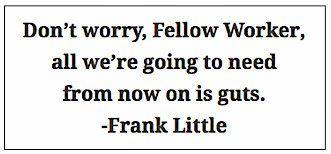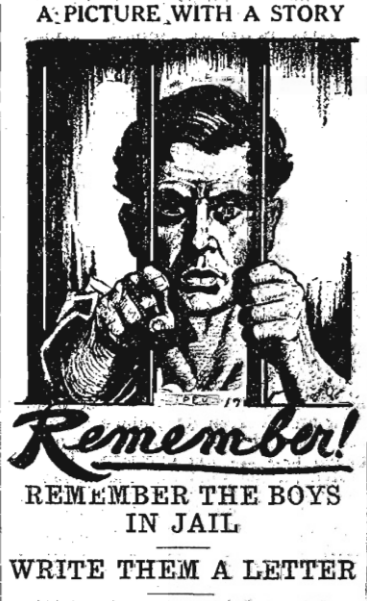 ———–
———–
Hellraisers Journal -Wednesday July 2, 1919
Kansas Class-War Prisoners, Who Are These Men?
From the Kansas City Workers’ World of June 27, 1919:
WHAT KIND OF BOYS DO THEY JAIL IN KANSAS?
ARE THESE MEN CRIMINALS?
On November 20,1917, a general roundup of union men was conducted in the oil fields of Kansas. Thirty-five were arrested without warrant on this date and held on the charge of vagrancy. Later they were indicted under a Federal charge and since that time they have been confined in various jails in the state.
Results of Confinement.
For eighteen months these men have sacrificed their freedom because of their loyalty to their ideals. Had they been willing to renounce their organization, and cease their activities, they would have been set free. This they have refused to do. Their bond has been set at $10,000 and until very recently every effort to secure a reduction has failed, and now only in the case of a few of the imprisoned men. As a result of their long months of confinement, one man has died, two have gone insane-one being confined in the insane asylum at Osawatomie, Kansas, and the other held in solitary confinement in the jail in Ottawa. Another man has become a nervous wreck, trembling like a leaf and falling to the floor in complete collapse at the slightest excitement. Two of them have lost all of their teeth. Men who were physical giants at the time of their arrest are today but a shadow of their former selves.
Who Are These Men?
Stephen Shurin [Shuren], the man now confined at Ossawatomie, comes from Philadelphia. His parents own their little home, and Stephen is their only child. The father is employed in the oil refinery, where Stephen, too, worked until the longing came over him to go “out west.” With one of his young companions, he started out to seek his fortune. He got as far as the oil fields of Kansas, and finding work, he has remained here for the past ten years, well known and well liked by his associates. About three years ago, he joined the Oil Workers’ Industrial Union [I. W. W.] and because of his membership in this organization he was arrested on the job near Augusta, Kansas in November, 1917.
Jail life at best is terrible. The losses of customary activity, month after month in dark, narrow cells, with nothing to do but think-think-think. Think of the fresh air, the sunlight, the birds, the joyous laughter of friends, the companionship of loved ones,-and then sink back in loathesome despair at the sight of the revolting, disease-infested walls, the huge jail rats, the half-putrid food, and the maddening steel bars that shut in the living dead.
So, when Stephen, nearly a year later found that instead of going to trail as he had expected, prosecuting Attorney Robertson had, at the last moment brought in a new indictment and the case had been set over until the March term of court, March 1919, he slipped of by himself, and was found with his throat cut from ear to ear. Only the most prompt attention saved his life. After two weeks, in the hospital, he was sent back to the jail in Wichita. Day after day, the light of reason faded. His companions [Fellow Workers] watched over him in three hour shifts, day and night for months. Not until a month ago was he permitted to go to an asylum where he could receive proper treatment.
In the meantime his poor old mother, in Philadelphia, mourns for her boy day and night. About three weeks ago one of the attorneys for defense called to see her. So crippled with rheumatism that she can scarcely walk, her whole thought is centered upon her son and over and over she asked,
You will get my boy out, who’t you? He was always a good, and when he went away he always sent money back to us. His father and I are getting old and he is all we have. You will see that he comes back to us, won’t you?
In the window was hanging the American flag and the card showing the purchase of the fifth Liberty Loan.
James Gossard is the boy who died. His people live at Urbana, Illinois, there they are well known and highly respected. On the day that Jim died, his older brother was brought home from France, minus one arm and otherwise injured. Jim, like Steve, came west to seek his fortune in the oilfields. He, too, realizing the hopelessness of the struggle except as the workers organize, joined the Oil Workers’ Industrial Union and because of this membership, was arrested on the job and imprisoned. The boys on the job called him “Sunny Jim” because of his rollicking good nature, and the hearty good will with which he met life.
A year in the terrible bastiles of Kansas slowly undermined his strength, and he quickly succumbed to attack of influenza.
When in Washington, D. C., about a month ago, one of his friends spent the evening with Jim’s sister, who is employed in the War Risk Department. She is a beautiful young woman and while she was eager to hear all about Jim she could do nothing but cry. She and Jim were pals, and as she said,
he was the best brother that ever lived. He and I were always together and I can’t give him up.
She knew nothing about the organization but
if Jim belonged to the I. W. W. it must be a good organization. I’m sure the world doesn’t understand it or there wouldn’t be no so much bitterness against it. He was always so honorable and honest even the little things that seemed of no importance.
Morris Hecht is of the Jewish race, not more than twenty years of age. He is tall and slender, with clear-cut features that bear a most striking resemblance to those of Jesus in the picture of “Jesus before the Wise Men.” He is beautiful to look upon and has the old Hebrew idealism that sacrifices all for the cause in which he believes.
He was born in Braddock, Pennsylvania. His father is a wealthy merchant, whose reputation is of the best. As soon as Morris was arrested, (he, too, had come west and found work in the oil fields) his father secured the promise of immediate release, providing Morris would renounce the organization and return home.Morris refused to renounce his organization.He said it would be the part of a contemptible coward to sneak out of jail by betraying a cause he knew to be right, and from November, 1917, until September, 1918, he remained in jail.
His father and aunt pleaded with Morris, telling him of the disgrace he was bringing upon the family, of how he was breaking his mother’s heart, that if he were convicted no respectable Jewish girl would ever consent to be his wife,-that he would be an outcast among his own people. The father told him that he would set Morris up in a business of his own, and he need want for nothing. Everything was said that would tend to tempt a boy and weaken his determination. It was a most tragic scene. Morris was plainly deeply touched, but as he said again and again,
Father, how can I do as you ask? I should hate myself forever. I cannot be so cowardly as to renounce my deepest conviction. Surely, of all the people in the world, our people know what it is to be persecuted and lied about, to be driven from place to place, from country to country. The Hebrew race has always suffered persecution. It hurts me more than I can say to know that mother is breaking her heart over me. But what can I do? I must be true to my self.
Consequently the prosecutors hate Morris and declare that they will send him to the penitentiary if it can be done. When they found he could not be “broken,” his bond was raise to $10,000 and since September, 1918, this fine young Jewish boy has been in dungeon in Topeka. Dungeon is the right word. Go and see for yourself.
Because of the publicity given this hole the boys were moved to Olathe last week. Here they must stay through the heat of the summer, unless some friends come to their assistance with bonds.
On June 8th, in a long heartbroken letter, his mother writes the following,
So you can see that our hands are tied unless you resort to the only avenue you have open, that is give up the organization for which you are giving your freedom, your health, and God forbid yet your life and for which you get nothing in return. Now, Morris, to say the least I feel desperate in my desire to help you but it seems impossible. I have written to every possible party who might assist us and it is always the same. No help can be gotten except if you Give Up Your Ideas. Then Morris, we can do every thing for you, as I am sure we can bring influence to bear to secure your freedom where you will be at liberty to live your life as you see fit.
Albert Barr, is about 22 years of age another fine looking boy who would attract attention in any gathering. Just before Christmas one of the attorneys visited the boys in the various jails, and when Topeka was reached in discussing the question of bond. Albert said,
Don’t bother about getting me out yet, for the first time in my life I have the time to read along scientific lines and I don’t want to go back on the slave market until I have finished the course of reading I have set myself to do.
Some of the books being read by the group confined in the Topeka jail were Lester Ward’s Pure Sociology, Outlines of Sociology, and Applied Sociology, Marx’s Capital, and books on astronomy, history, economics.
One of the sheriffs recently, in speaking to his wife, said,
These men are not criminals. They are here for labor activities.
Because of their labor activities they have suffered imprisonment and all kinds of indignities for nearly two years. Their case is set for trial in September. In the meantime, they should be at liberty. Are there not men and women enough in Kansas to see to it that bond for them is given without further delay?
———-
~~~~~~~~~~~~~~~~~~~~~~
SOURCES
Quote Frank Little re Guts, Wobbly by RC p208, Chg July 1917
https://books.google.com/books?id=n-ygPQAACAAJ
The Workers’ World
(Kansas City, Missouri)
-June 27, 1919, page 2
https://www.marxists.org/history/usa/pubs/workersworld/WW13.pdf
Re Names of Prisoners, see index:
American Political Prisoners
Prosecutions Under the Espionage and Sedition Acts
-by Stephen Martin Kohn
-intro by Howard Zinn
Greenwood Publishing Group, 1994
https://books.google.com/books?id=-_xHbn9dtaAC
Note: Using spelling from American Political Prisoners for Shuren/Shurin. Both names with IWW return same # of results from the google.
Note: I am now thinking that Morris Hecht is Morris Hunt misnamed here (more research needed):
https://weneverforget.org/tag/morris-hunt/
IMAGE
WWIR IWW Remember the Boys in Jail, OH Sc p3, Aug 21, 1918
https://www.marxists.org/history/usa/pubs/ohio-socialist/030-aug-21-1918.pdf
See also:
Tag: Wichita IWW Class War Prisoners
https://weneverforget.org/tag/wichita-iww-class-war-prisoners/
WE NEVER FORGET: FW James Gossard
Who Died October 30, 1918, Awaiting Trial in Harvey County Jail, Newton, Kansas
~~~~~~~~~~~~~~~~~~~~~~~~~~~~~~~~~~~~~~~~~~~~~
If I Had a Hammer – Peter, Paul, and Mary

